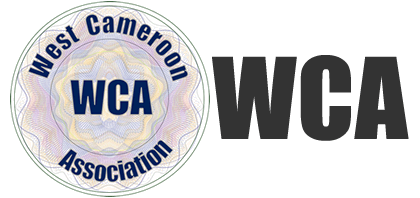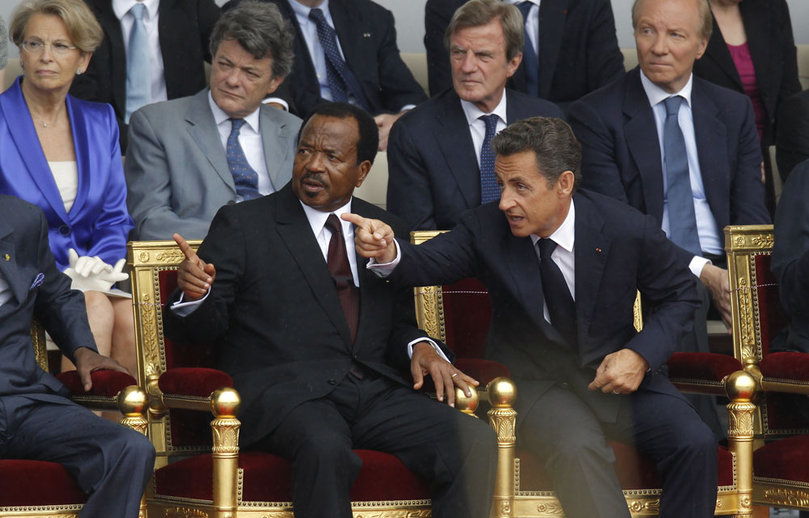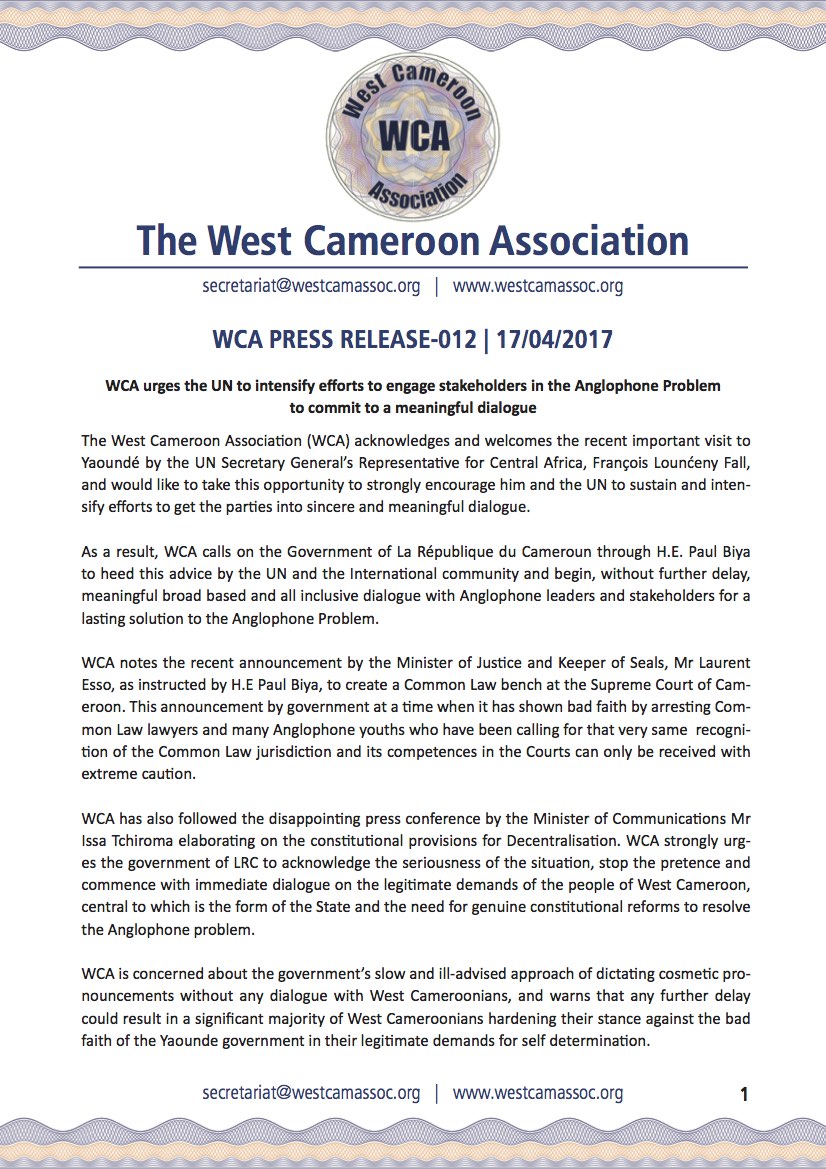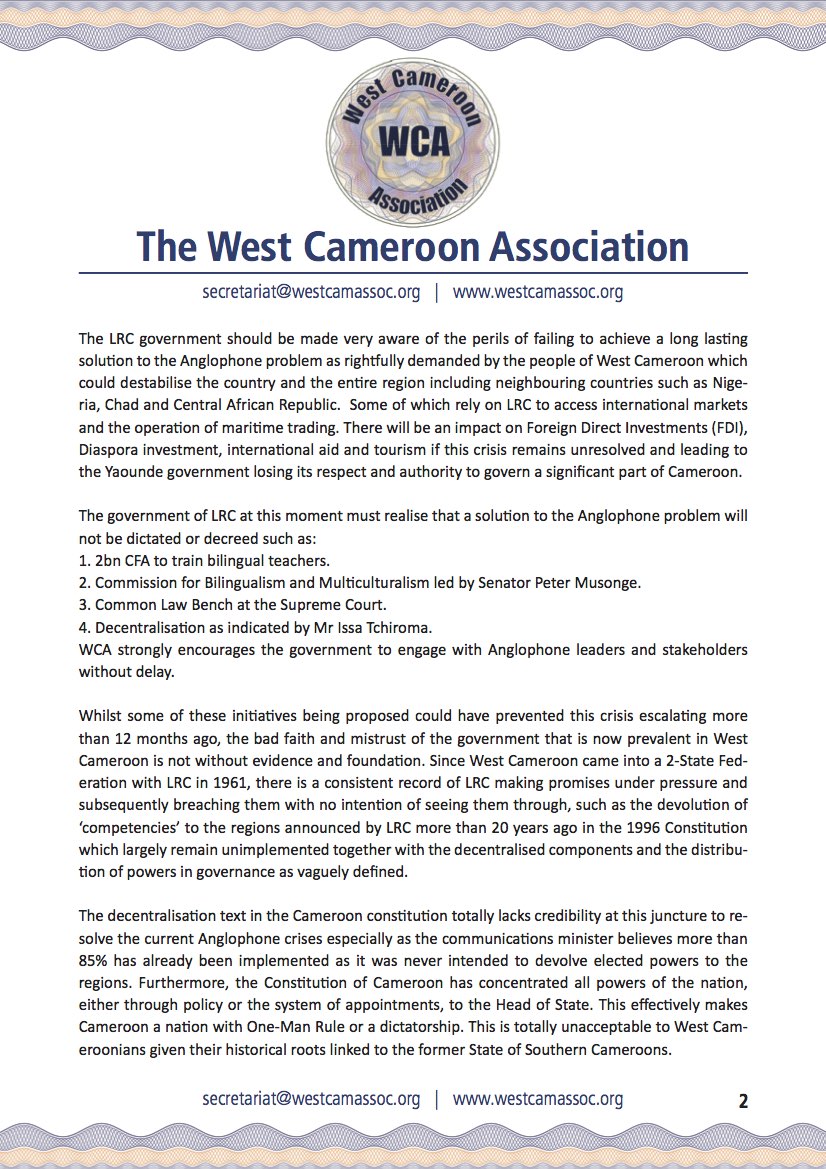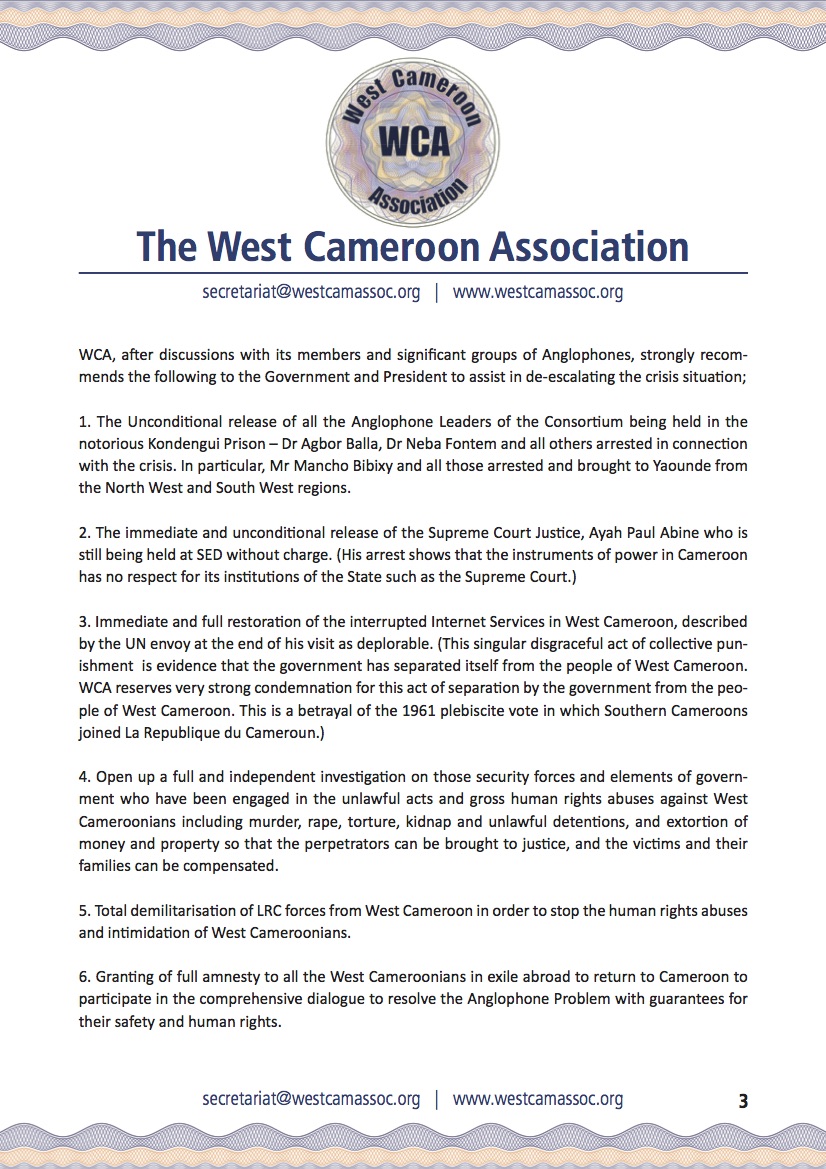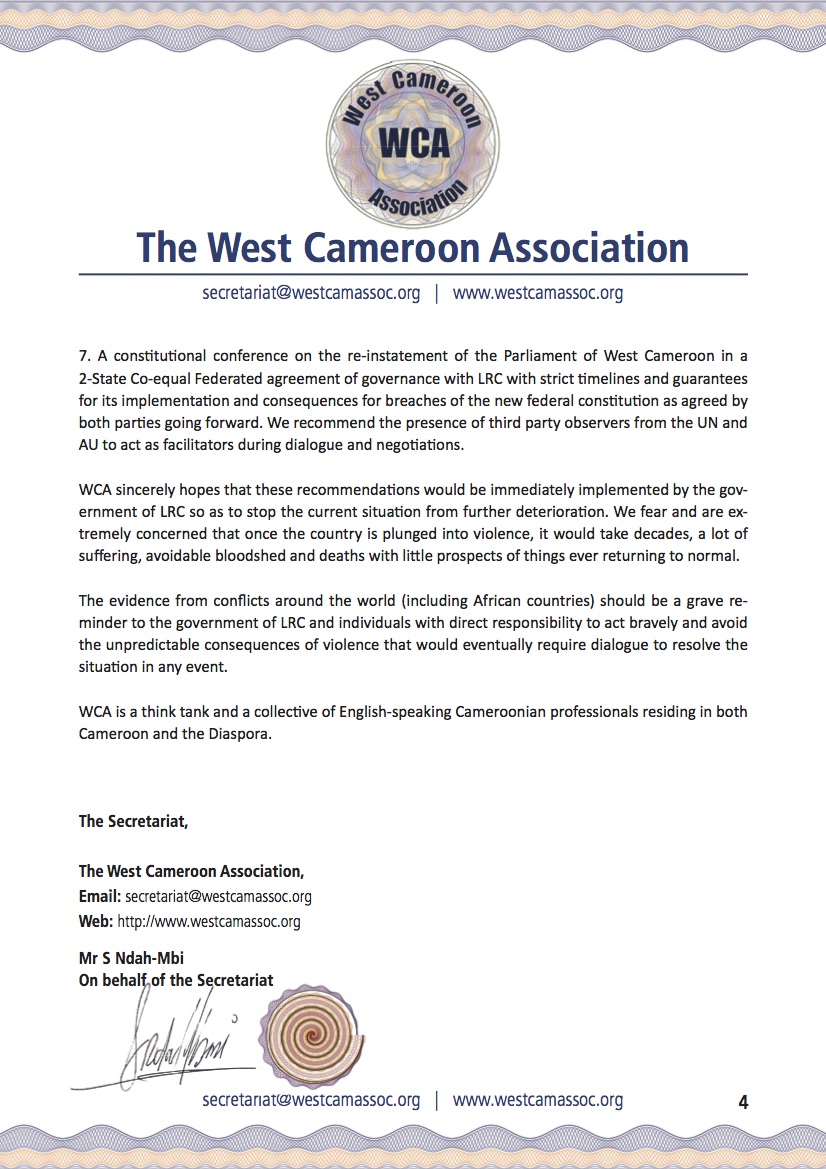WCA urges the UN to intensify efforts to engage stakeholders in the Anglophone Problem to commit to a meaningful dialogue
The West Cameroon Association (WCA) acknowledges and welcomes the recent important visit to Yaoundé by the UN Secretary General’s Representative for Central Africa, François Lounćeny Fall, and would like to take this opportunity to strongly encourage him and the UN to sustain and intensify efforts to get the parties into sincere and meaningful dialogue.
As a result, WCA calls on the Government of La République du Cameroun through H.E. Paul Biya to heed this advice by the UN and the International community and begin, without further delay, meaningful broad based and all inclusive dialogue with Anglophone leaders and stakeholders for a lasting solution to the Anglophone Problem.
WCA notes the recent announcement by the Minister of Justice and Keeper of Seals, Mr Laurent Esso, as instructed by H.E Paul Biya, to create a Common Law bench at the Supreme Court of Cameroon. This announcement by government at a time when it has shown bad faith by arresting Common Law lawyers and many Anglophone youths who have been calling for that very same recognition of the Common Law jurisdiction and its competences in the Courts can only be received with extreme caution.
WCA has also followed the disappointing press conference by the Minister of Communications Mr Issa Tchiroma elaborating on the constitutional provisions for Decentralisation. WCA strongly urges the government of LRC to acknowledge the seriousness of the situation, stop the pretence and commence with immediate dialogue on the legitimate demands of the people of West Cameroon, central to which is the form of the State and the need for genuine constitutional reforms to resolve the Anglophone problem.
WCA is concerned about the government’s slow and ill-advised approach of dictating cosmetic pronouncements without any dialogue with West Cameroonians, and warns that any further delay could result in a significant majority of West Cameroonians hardening their stance against the bad faith of the Yaounde government in their legitimate demands for self determination.
The LRC government should be made very aware of the perils of failing to achieve a long lasting solution to the Anglophone problem as rightfully demanded by the people of West Cameroon which could destabilise the country and the entire region including neighbouring countries such as Nigeria, Chad and Central African Republic. Some of which rely on LRC to access international markets and the operation of maritime trading. There will be an impact on Foreign Direct Investments (FDI), Diaspora investment, international aid and tourism if this crisis remains unresolved and leading to the Yaounde government losing its respect and authority to govern a significant part of Cameroon.
The government of LRC at this moment must realise that a solution to the Anglophone problem will not be dictated or decreed such as:
1. 2bn CFA to train bilingual teachers.
2. Commission for Bilingualism and Multiculturalism led by Senator Peter Musonge.
3. Common Law Bench at the Supreme Court.
4. Decentralisation as indicated by Mr Issa Tchiroma.
WCA strongly encourages the government to engage with Anglophone leaders and stakeholders without delay.
Whilst some of these initiatives being proposed could have prevented this crisis escalating more than 12 months ago, the bad faith and mistrust of the government that is now prevalent in West Cameroon is not without evidence and foundation. Since West Cameroon came into a 2-State Federation with LRC in 1961, there is a consistent record of LRC making promises under pressure and subsequently breaching them with no intention of seeing them through, such as the devolution of ‘competencies’ to the regions announced by LRC more than 20 years ago in the 1996 Constitution which largely remain unimplemented together with the decentralised components and the distribution of powers in governance as vaguely defined.
The decentralisation text in the Cameroon constitution totally lacks credibility at this juncture to resolve the current Anglophone crises especially as the communications minister believes more than 85% has already been implemented as it was never intended to devolve elected powers to the regions. Furthermore, the Constitution of Cameroon has concentrated all powers of the nation, either through policy or the system of appointments, to the Head of State. This effectively makes Cameroon a nation with One-Man Rule or a dictatorship. This is totally unacceptable to West Cameroonians given their historical roots linked to the former State of Southern Cameroons.
WCA, after discussions with its members and significant groups of Anglophones, strongly recommends the following to the Government and President to assist in de-escalating the crisis situation;
1. The Unconditional release of all the Anglophone Leaders of the Consortium being held in the notorious Kondengui Prison – Dr Agbor Balla, Dr Neba Fontem and all others arrested in connection with the crisis. In particular, Mr Mancho Bibixy and all those arrested and brought to Yaounde from the North West and South West regions.
2. The immediate and unconditional release of the Supreme Court Justice, Ayah Paul Abine who is still being held at SED without charge. (His arrest shows that the instruments of power in Cameroon has no respect for its institutions of the State such as the Supreme Court.)
3. Immediate and full restoration of the interrupted Internet Services in West Cameroon, described by the UN envoy at the end of his visit as deplorable. (This singular disgraceful act of collective punishment is evidence that the government has separated itself from the people of West Cameroon. WCA reserves very strong condemnation for this act of separation by the government from the people of West Cameroon. This is a betrayal of the 1961 plebiscite vote in which Southern Cameroons joined La Republique du Cameroun.)
4. Open up a full and independent investigation on those security forces and elements of government who have been engaged in the unlawful acts and gross human rights abuses against West Cameroonians including murder, rape, torture, kidnap and unlawful detentions, and extortion of money and property so that the perpetrators can be brought to justice, and the victims and their families can be compensated.
5. Total demilitarisation of LRC forces from West Cameroon in order to stop the human rights abuses and intimidation of West Cameroonians.
6. Granting of full amnesty to all the West Cameroonians in exile abroad to return to Cameroon to participate in the comprehensive dialogue to resolve the Anglophone Problem with guarantees for their safety and human rights.
7. A constitutional conference on the re-instatement of the Parliament of West Cameroon in a 2-State Co-equal Federated agreement of governance with LRC with strict timelines and guarantees for its implementation and consequences for breaches of the new federal constitution as agreed by both parties going forward. We recommend the presence of third party observers from the UN and AU to act as facilitators during dialogue and negotiations.
WCA sincerely hopes that these recommendations would be immediately implemented by the government of LRC so as to stop the current situation from further deterioration. We fear and are extremely concerned that once the country is plunged into violence, it would take decades, a lot of suffering, avoidable bloodshed and deaths with little prospects of things ever returning to normal.
The evidence from conflicts around the world (including African countries) should be a grave reminder to the government of LRC and individuals with direct responsibility to act bravely and avoid the unpredictable consequences of violence that would eventually require dialogue to resolve the situation in any event.
WCA is a think tank and a collective of English-speaking Cameroonian professionals residing in both Cameroon and the Diaspora.
The Secretariat,
The West Cameroon Association,
Email: secretariat[at]westcamassoc[dot]org
Weblink: http://www.westcamassoc.org/

